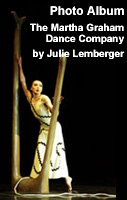
 |
 |
 |
 |
 |
|
The Buzz, 3-26: ...And
Why You Won't See Him in France By Paul Ben-Itzak (Editor's Note: The opinions expressed in the Buzz are those of its author, and do not necessarily reflect those of others on the Dance Insider staff or among its advertisers.) PARIS -- Once again, this year's Rencontres Choregraphiques (so-called) Internationales de Seine-Saint-Denis, which purports to survey the pantheon of contemporary dance, includes no, zero, nul representatives from the country that produced the form and that continues to push it to new frontiers. When I looked at the roster of 18 companies for this spring festival in the suburbs of Paris and discovered that, notwithstanding that the titles of many of the works play on American-English expressions, none of the companies performing them are from the States, my initial, visceral reaction was that this is racism, pure and simple. That's a pretty incendiary charge and, on reflection, strictly not accurate; the exclusion here is of a nationality, not a race. But my reasons for percieving the exclusion this way were honest; I can now begin to understand what a Black, Asian, or Hispanic person must feel like watching television and seeing themselves so under-represented. In effect, such exclusion would make a whole race invisible. In the case of the ongoing exclusion of United States of Americans from the Rencontres so-called Internationales, this invisibility is doubly conspicuous because of the indisputability of the primary contribution of American artists to the form. We invented it! Through a spokesperson, I posed the following questions to Anita Mathieu, the festival's director: "The festival is called Encounters Choreographic International. But this year, last year, and, I believe, the year before, there were no American companies in your 'international' festival. As you know, modern dance was born in the US -- Duncan, St. Denis, Graham. How can you give a festival and call it 'international' when you have exclude companies from the US? To me, it seems like the most profound type of racism -- the racism of exclusion." (As noted above, since posing this question, I've revised my notion that this can be considered racism in the classic sense. It isn't.) Here's how Mathieu answered through the spokesperson (freely translated by me from the French; the spokesperson, fluent in English, did not respond to a request to confirm the translation): "I have seen from time to time the work of American companies, but always abroad. It seems that the American companies do not communicate very much and rarely send their information. For my part, I continue to travel very much and select the companies whose work I find interesting." This response is more than a little disingenuous. It parallels what the president of an "exclusive" country club might say if asked why his rolls didn't include many Blacks: It's not that we're racist; they just never apply! (At this point I should disclose that when the Rencontres held platforms in New York, I worked with a company that presented at one of these platforms and that was not selected.) If Mathieu does not hear from many US companies eager to perform at her festival, it's because of France's well-known and accurate reputation for being averse to programming any American companies post-Bill T. Jones. (The provinces and some suburbs have been an exception to this rule, programming companies like those of Doug Elkins, Momix, and Elisa Monte. John Jasperse has been programmed at the Montpellier festival.) I don't think this exclusion is so innocuous. Were theaters and festivals in France to program more recently developed American choreographers, French audiences might learn that much of what passes for cutting-edge choreography here, at least among the younger generation of choreographers, is not so cutting edge but in fact exploring as new territory US artists of the last 20 years have already charted. Reading Maura's Flash of today on David Dorfman's current season with the Harkness Dance Project, it strikes me that by excluding American artists, Mathieu and her cohorts are cheating their audiences of a vein of dance that could provide an invigorating counter-pane to the cloistered "experiments" of many young French choreographers. In her review of today, which she frames as a reflection on "American-ness," Maura uses the word "expansive" to describe Dorfman's "Lightbulb Theory." Oh, but that French audiences could see that we are this too -- not just militaristic bullies self-confirmed in our own way of thinking, as defined by George Bush, but "expansive," as presented by David Dorfman! But I fear that notwithstanding manifestos that purport to embrace the world, when it comes to opening their hearts to current US choreographers, French presenters like Mathieu would prefer to retract, lamely throwing up the crutch of an excuse that it's the fault of American choreographers because they never call, they never write. Contrast this with the, er, expansiveness of American presenters, whose horizons go far beyond below 14th Street to embrace the WHOLE globe, and I would just point Mathieu to the root of the word "Rencontre": Meet. Meeting people doesn't just mean waiting in your flat to see who comes 'round; you have to go out sometimes too.
|